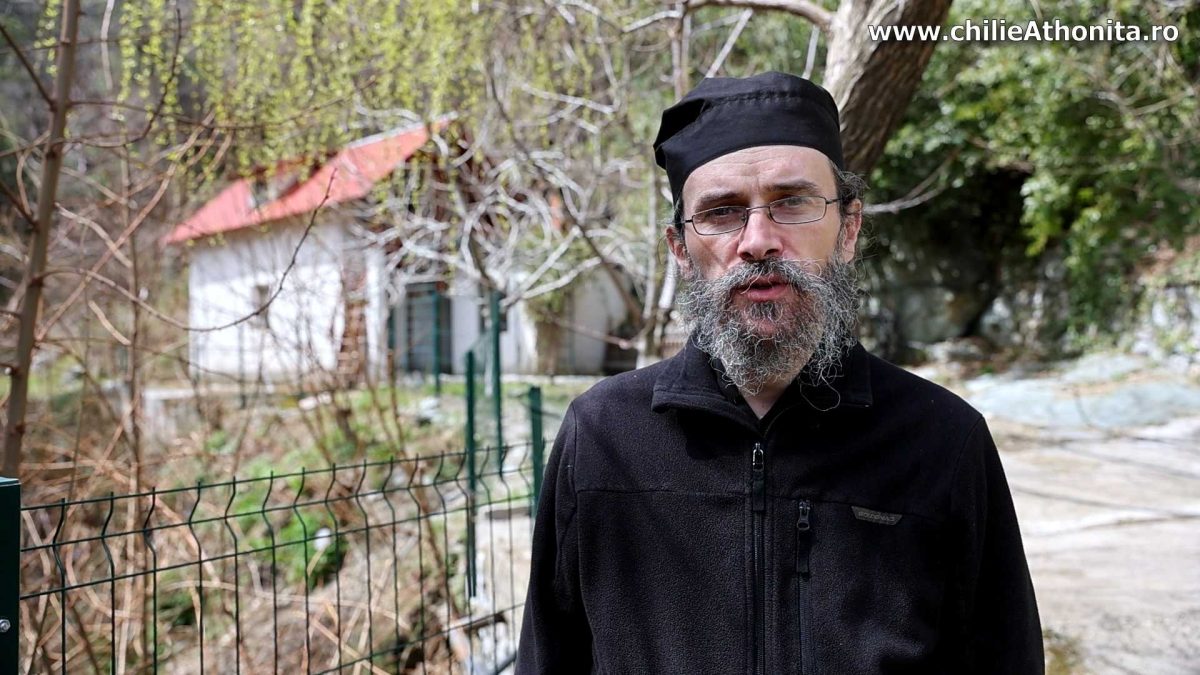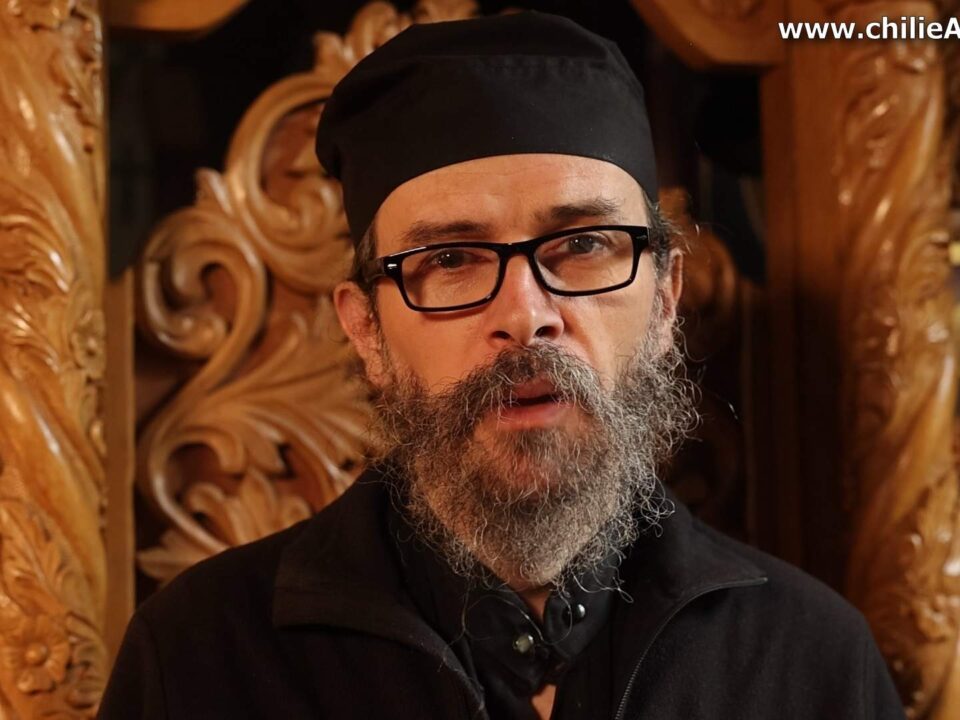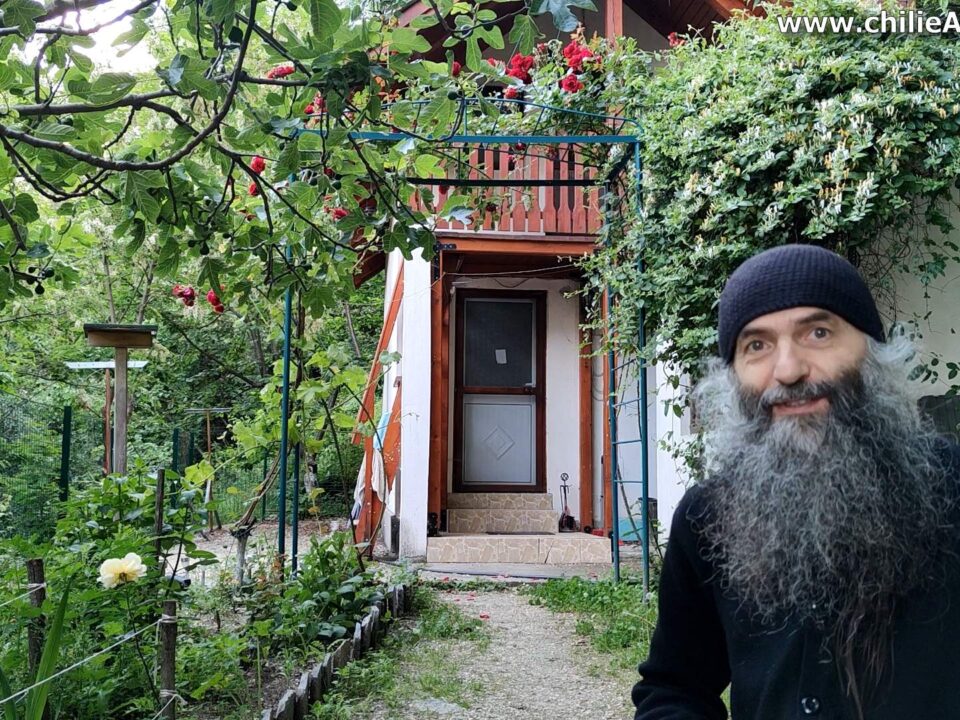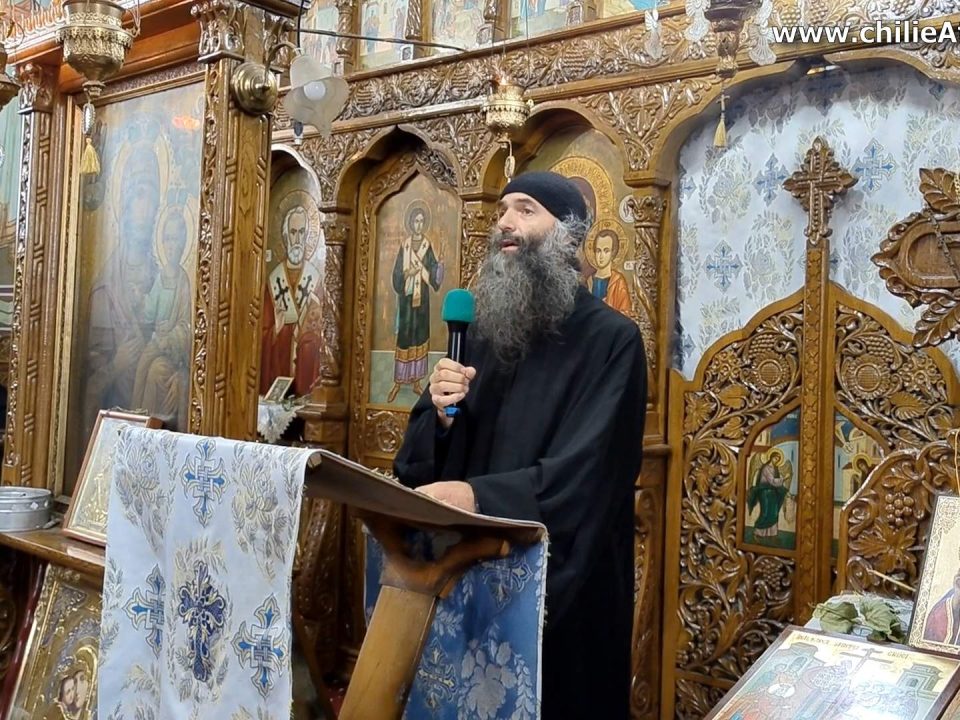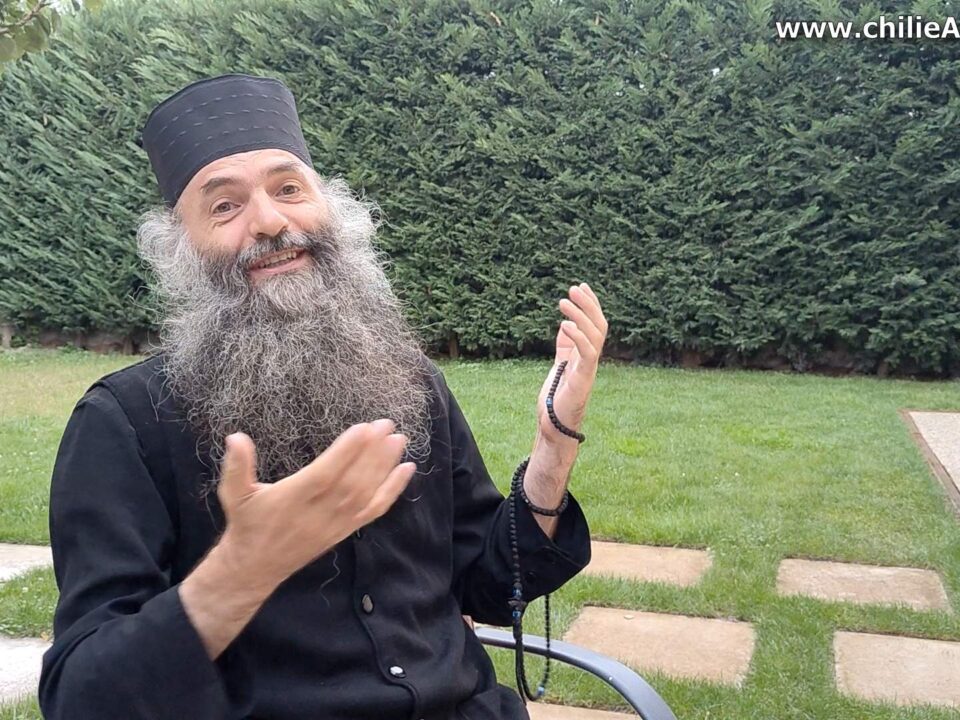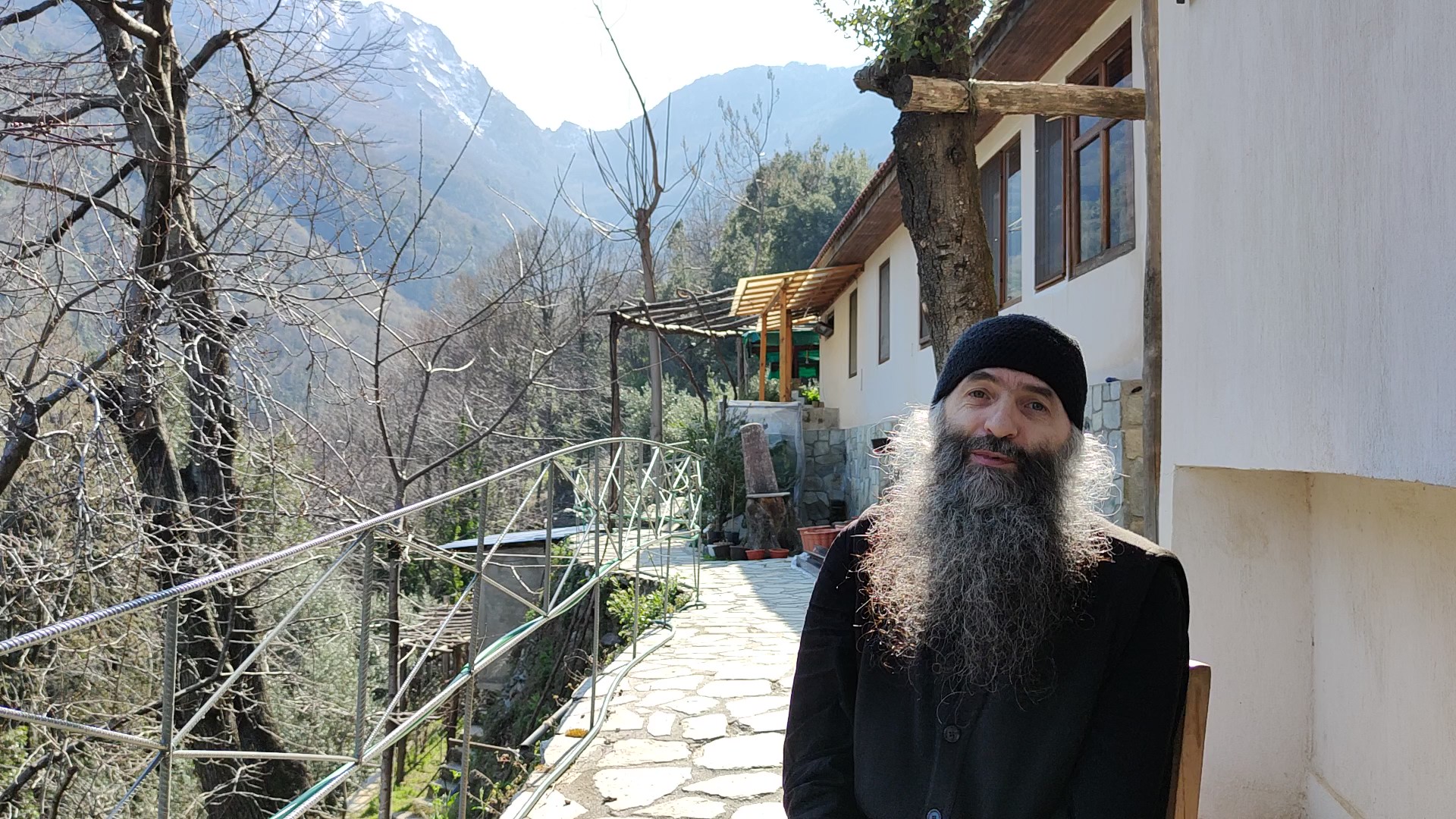
Miracles of the Mother of God at the Beginnings – Father Pimen Vlad
31 March 2022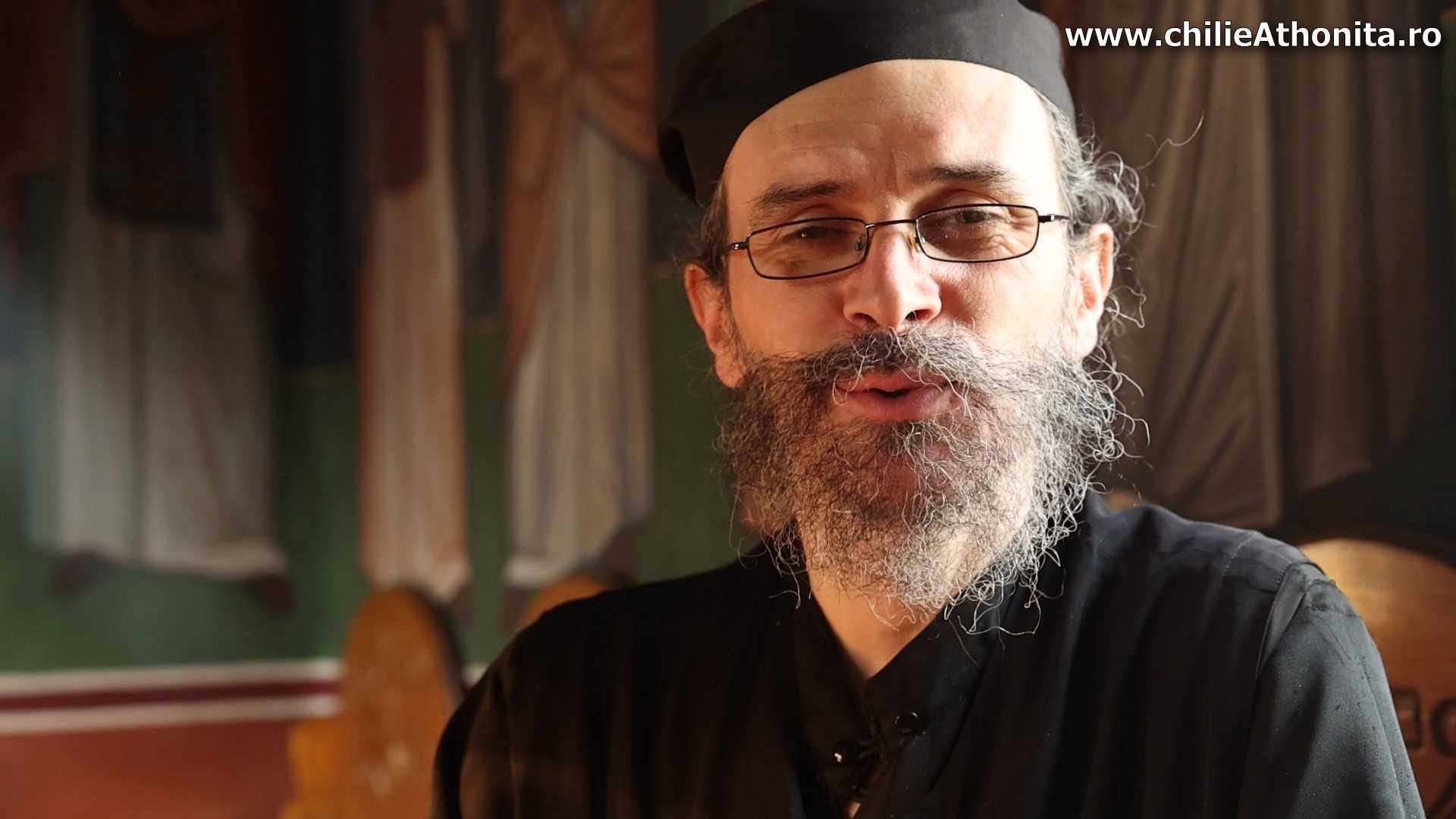
Evidence of the Existence of the Devil – Father Theologos
5 April 2022How does someone acquire the ability to write the second most important book in the Church?…And if we consider that the Bible is, actually, a collection of books, then we can ask: How does someone acquire the ability to write the most important book in the Church?
Watch this video and you will find out!
Enjoy! (after the clip you have the transcript)
He bent down on all fours and picked up the piece of bread with his mouth. An Athonite Cell Joys from the Holy Mountain In the name of the Father, and the Son and the Holy Spirit. Now and forever and to the ages of ages. Amen. Lord have mercy, Lord have mercy, Lord have mercy. Through the prayers of our holy fathers, Lord Jesus Christ, Son of God, have mercy on us. Amen. I will tell you something that I hope you know, but that I think you do not know. It has to do with the book that is most important, let’s say, from a spiritual point of view. You will say that it is the Bible, of course. And that is true. But let’s not forget that the Bible is not a book, I don’t know if you knew this, but the Bible is a collection of books, written by different authors who had more or less of a connection with each other. The most important book from the spiritual point of view, besides the Bible, called ‘Vivlia’ in Greek, meaning books, so a collection of books, is the book called The Ladder. The Ladder of Divine Ascent.
Written by someone, a genius by the name of St. John Climacus, also called St. John Scholasticus. We do not know exactly who he was. But you can imagine that if a single person was able to write this book, it means that his holiness was something extraordinary, completely extraordinary in the Church. Because of this, the Church has conferred upon him a special Sunday of Great Lent. We won’t be getting into an in-depth analysis of the book, although it would be more than worthy of this. But I wish to tell you something that will help you about St. John Climacus, how he wrote his book and how he was able to write it. Meaning, how did God give him this great charisma? First of all, as I said, let’s say a few words about St. John Climacus. We do not know who he was exactly. We know very little about the author of The Ladder. We know that he was born around the year 579-580 in Syria. You should know that there are many saints, great saints from Syria, such as St. John Climacus, St. Ephrem the Syrian, St. Isaac the Syrian, St. Romanos the Melodist and so on. About St. John Climacus, we know that he departed to the Lord around the year 649-650, in Holy Mount Sinai. March 30th is assigned as the day of his death, but things are not certain, as I’ve said, there is very little known about him.
We do know though that he entered the monastery of Holy Mount Sinai at the age of 16. At the monastery of St. Catherine. Until that age he had acquired a solid understanding of all the knowledge of the time. Most probably because he came from a wealthy family. That is why he is also called ‘Scholasticus’. The word, like in English, means ‘the one with school’, ‘the learned one’. And this special training of his in the sciences of the time, brought about the name of St. John Scholasticus. Regardless of this, his abbot, Abba Martyrius, was very tough on him and humbled him so that he would not be enslaved to the spirit of pride. Abba Martyrius shaped St. John Climacus for 19 years. After the death of the Venerable Martyrius, St. John withdrew to the wilderness in a place called Thola, close to the monastery, where he lived in solitude for 40 years. So he was a hermit for 40 years, after being in obedience to his abbot for 20 years. Of course, after this period of 40 years, he was asked by the monks to be the igumen at the monastery of Holy Mount Sinai.
Of course, during his igumenship he composed The Ladder, at the request of an igumen of a nearby monastery, at the request of father John from Raithu monastery. The Ladder of Divine Ascent, as this work is called, is composed of 30 steps, 30 chapters. In Romania I recommend the translation by father Dumitru Staniloae volume 9. You should know that what compelled St. John Climacus to write, what gave him the possibility to write The Ladder, was his spiritual measure, which like I said, came through humility. And not only because he had a vast intellectual capacity, because many had vast intellectual capacities but unfortunately at this time are in hell. That is why, when this son of a nobleman went with Abba Martyrius into the synaxis of the skete, the synaxis of all the ascetics in the area of Sinai, Abba Martyrius, in front of everyone, threw down a piece of bread. As a sign of contempt. Of course all this was done to humble him, and Abba Martyrius did it with a lot of love.
When the Abba threw the piece of bread on the ground, St. John Climacus, the son of a nobleman, let’s not forget, especially at that time, lords and noblemen were far above ordinary people, in that moment, the future St. John Climacus, bent down on all fours and picked up the piece of bread with his mouth. Thus becoming a laughing stock to everyone. And the fathers, the elders of the Skete told Abba Martyrius that his spiritual child would become the future igumen of Sinai. Understand?
Because, this gesture shows a certain interior state, it showed the St. John had completely renounced the world, the glory of the world, the slime of everyday, which brought him towards purity of mind. So consider what a diamond of a mind he had, and what an experience of eternity St. John Climacus had within himself. He did not have any of the parasites of this world in his mind, because for him all these things were not important. Of course the only importance of these worldly things came from their importance in eternity. Meaning how much he is growing his love towards others. This is very important. We need to remember that things are weighed based on their importance in eternity. So let’s not cling to all these transient things of this world. Like, what others did to me, what others said to me, and so on. I am thinking, what would we do now if someone threw us a piece of bread on the table? I am not talking about having it thrown down on the ground in front of everybody, to have to bend down. Just to have it thrown on the table for us, our ego would rise within us, and we would have so many retorts for that person.
Avachir also had his mind on eternity. He is one of the monks we are told about in one of the chapters of the book. Avachir was a bit loose-tongued, and the brothers would constantly berate him, would constantly admonish him. And many times they would throw him out of the refectory and he would remain hungry. This happened for 15 years. So St. John Climacus goes to Avachir and asks him, “Brother, what are you thoughts, do you not revolt against your brothers for berating you and throwing you out of the refectory just because you said something?” And Avachir said, “No, because the brothers are not doing this out of hatred for me, they are just pretending, they are just trying me to see whether I am a good monk. It will soon be 15 years since I became a monk, and they will try me to see whether I am a good monk.” Do you understand what a good thought this brother Avachir had? Shortly after, he died, and the igumen told them to bury him with the martyrs, because through the good thought that he would put forward, he never became troubled within himself. Of course, we who consider ourselves smarter and more logical, we think, so and so is saying this to me, and so and so is doing this to me, and I’ll show him, just wait and see what I will do to them. This is not good brothers. Let’s put a good thought forward. We can say, “The other is trying me, even if he slaps me, big deal.” I am not saying that hitting is good, God will judge the other for doing that, but what I mean is let’s say, “The other is not doing this out of hate, he is just trying me.” Let’s not become troubled. Because if we become troubled, you know very well that things will not turn out well. The problem will not be resolved by being troubled. The problem is resolved by being calm. And even if we are to act, we act calmly, with decision and with courage. Calmness brings us the enlightenment of the mind, not agitation, not anger. Understand? For a self-loving person, all these things are very, very difficult. Because fame, comfort, the world that this person searches for, make those other things unreachable, unbearable. And that’s kind of what we are all like. In the past people, as you can see, were very, very free because of this awareness of the eternity within them. Freedom comes from the awareness of eternity.
They truly knew that they are eternal, so they would leave all these worldly things, these small things, behind. But folks, this is how we get to tranquility and peace. We get to tranquility and peace by lifting up the cross. Think about what would have happened if Avachir would have responded to the others if he would have set everyone straight, and so on. Maybe he would have set everyone straight, but he would have lost his peace. He would have lost his humility. And of course these are the vestments of divinity. And through these man reaches theosis. That is how man reaches peacefulness, purity and joy. Because Avachir had joy even though he was admonished and berated by all. Of course this humility, this vestment of divinity, this pure thought, alienated him from the world and took him to heaven.
Another case which St. John Climacus brings up in his book, The Ladder, is the case of Isidor. Isidor was also a nobleman like him, from the noble house of Alexandria. Alexandria at that time being a sort of New York, meaning it was a city when the rest of the places where hamlets of 2-3 houses. And this nobleman comes from Alexandria, and Abba saw that he truly had a very harsh character, and very proud, very prickly. So he told him, “It’s fitting that your name is Isidoros – Isidor, meaning like steel.” He had the constitution of steel. Abba asked him, “Do you want to be saved?” He answered, ‘Yes, I want to be saved, I want to be rid of my harshness.” Abba told him that he is not asking him to do hard things, it is very simple. “You will go to the gate of the monastery,” because in the past monasteries, and even today in the Holy Mountain, are built like fortresses with walls, and there is a gate, “you will go to the monastery where everyone passes by, you will make a metania to each and you will say with all sincerity, ‘Folks pray for me for I am an epileptic.'” Think about what that means.
Put yourself in those shoes to see how it is. I have done this, but I only said it in my head, I didn’t say it to the people that were passing by at the monastery where this was. Look at all the people passing by on the street, and try to tell them all, known and unknown people, “Please forgive me, pray for me for I am an epileptic, I am sick in the head.” This is a great humility. And Venerable Isidor did this for years. St. John Climacus asked him, “Brother, how was it?” He responded, “At the beginning I did this with a lot of hostility, with a lot of resistance, with hate against the one who ordered this. I said, “I need to do it so that I may be done with it. The next year I was already thinking about the reward of eternal life, the reward of the blessing and the peace that I could see slowly taking shape in my soul. And the next years after that I was thanking God and seeing myself as unworthy to live, and that I am the least of all men, and I wanted to embrace everyone.” His heart had softened. Understand?
His heart had softened and from a heart of stone, a heart of steel, Isidoros – like steel, it became a spiritual heart, a heart of spirit. From a heart of steel it became a heart of spirit. Understand? Finally, Isidor told St. John and the gatekeeper, who he had always been with, “I am going to the Lord. I will die shortly,” and he said to the gatekeeper, ‘If I have boldness before God, I will take you with me so that we may be together there too.” And truly after a few days, Saint Isidor died, and, and a few days later, the gatekeeper died as well. He took him with him. Of course without the gatekeeper having any kind of illness or anything. Now, if we read the whole Ladder, we will see other examples like this. Besides examples you will see many rulings, apothegms grouped by theme. These rulings, these apothegms come from the experience of St. John Climacus. This is a vast experience. Understand? He reached this measure, this experience by, as I said, considering all the things of the world unimportant.
I will repeat myself, their importance is only for our biological existence and for eternity. Here on earth we do not need anything brothers. We need a plate, clothing and a roof above our heads. Understand? St. John Climacus is the one who says this. We do not need anything else. If we have something to eat, to clothe ourselves against the cold and to cover our bodies, and a bed in which to sleep. That’s it. Everything on top of this is trivial, chasing the wind.
So now you will ask me if St. John Climacus, this giant of Orthodoxy, and of psychology, and of spirituality, and of therapeutics of the soul has written any other books. Brothers, he has not. Why? Because St. John Climacus wrote this book like a diamond. He polished it and did not jump from one to another. He did not aim for quantity, he wrote it to be of quality. He wrote it to be of quality. This is very important. Brothers, let’s leave behind quantity, and let’s not run to find out what has happened here, what has happened there, because we will disperse our mind, and then we cannot do anything. It is better to do a good thing. If something is worth doing, let’s do it well. Understand? Let’s do it well. St. John Climacus, saints in general, are the most striking evidence that those who renounce the world, and become sanctified, help the world. Those who have their mind in heaven. We should know that this is very necessary because one has to know where to lead a person. Meaning we have to bring the person to heaven, but if you do not have the experience of heaven, how do you bring them to heaven? How do you pull him to heaven? In the dark? Brothers, it is very difficult, nobody knows the way to heaven, only he who has been there. Scripture says this too. We are in hell. But, if you do not know from experience how to find heaven, by trying to help someone, it turns out even worse. Maybe you will entrench him even more in hell. Understand?
Because of this we have to detach, as I said, from the slime of everyday, from the chaos of these attention centers from everyday, like the news and so on, which attract us at every step. That is how we start a multitude of things and do not finish any of it. If you are not going to read The Ladder, although I recommend that you do read The Ladder, because, as I said, it is the second or first, if you wish, book of Orthodoxy, if we consider the Bible to be a collection of books. If we do not read it at least let’s try to follow a little bit the example of St. John Climacus. Let us emulate his his example a little and do something in life. And to have the experience of heaven. May God help us in this. Through the prayers of our holy fathers, Lord Jesus Christ, Son of God, have mercy on us. Amen.
Pomelnice online și donații
Doamne ajută!
Dacă aveți un card și doriți să trimiteți pomelnice online și donații folosind cardul dumneavoastră, sau/și să susțineți activitatea noastră filantropică, inclusiv acest site, vă rugăm să introduceți datele necesare mai jos pentru a face o mică donație. Forma este sigură – procesatorul de carduri este Stripe – leader mondial în acest domeniu. Nu colectăm datele dvs. personale.
Dacă nu aveți card sau nu doriți să-l folosiți, accesați Pagina de donații și Pomelnice online .
Ne rugăm pentru cei dragi ai dumneavoastră! (vă rugăm nu introduceți detalii neesențiale precum dorințe, grade de rudenie, introduceri etc. Treceți DOAR numele!)
Mai ales pentru pomelnicele recurente, vă rugăm să păstrați pomelnicele sub 20 de nume. Dacă puneți un membru al familiei, noi adăugăm „și familiile lor”.
Dumnezeu să vă răsplătească dragostea!


